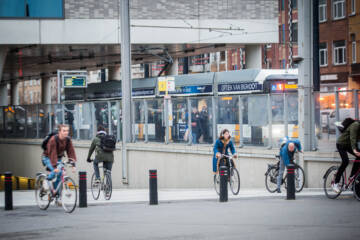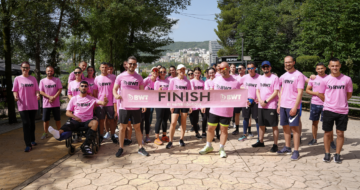Dragons’ Den gives BDO Belgium wings

Many companies and organisations lack a genuine innovation culture. With Dragons’ Den, BDO Belgium is not falling into this trap, as witnessed by this new internal innovation trajectory.
Many companies and organisations lack a genuine innovation culture. With Dragons’ Den, BDO Belgium is not falling into this trap, as witnessed by this new internal innovation trajectory.
Employees have little time or freedom to think creatively, budgets are limited and support among the management and the team is often small. In short, many companies and organisations lack a genuine innovation culture. With Dragons’ Den, BDO Belgium is not falling into this trap, as witnessed by this new internal innovation trajectory.
The name Dragons’ Den is a reference to the British series of entrepreneurs of the same name and the Flemish television programme ‘Leeuwenkuil’, where up-and-coming entrepreneurial talents pitch their business idea before seasoned top entrepreneurs looking for a golden idea. So, now we know where Patrick Kestens got the inspiration. He is the former inspirational force behind the Corda INCubator, a breeding ground for innovative start-ups and scale-ups. For the last year or so, as innovation & intrapreneurship manager, together with Hennie Herijgers, partner and innovative power at BDO Belgium, he has been the driving force behind the project to stimulate, support and develop BDO's innovation capacity and internal entrepreneurship.
More important than value and the success of the idea is the spirit of innovation we want to cultivate.
Space and support for creativity
The Dragons’ Den concept is brilliant in its simplicity: create an environment in which employees can - and want to! - let their creativity run wild and present their innovation ideas without inhibitions. Each idea is tested by an independent innovation board in terms of feasibility and potential to create value. For BDO and for customers, directly or indirectly. “Every one of our nearly 1,000 employees has the opportunity to pitch an idea,” says Patrick Kestens. “There is only one condition: if you decide to join in, you have to commit yourself to the project. On the other hand, depending on the phase in which the idea grows and becomes more concrete, they also get a budget and the time to put it into practice. Knowing that nobody – and this is extremely important – is being judged on the evaluation by the innovation board.”
Stopping is a possibility, failure does not exist. Car maker Henry Ford was once fined because his first car made too much noise. Imagine that would have stopped him! Drawbacks are just a part of innovation and entrepreneurship. More important than the value and success of an idea is the spirit of innovation that BDO aims to cultivate.
Successful innovation only succeeds with the right culture. A culture that is open to creativity in an atmosphere of trust. The direct result – the innovation in itself – is important, but the underlying effects are at least as valuable. “Innovation also gives energy,” says Hennie Herijgers from experience. “It makes you look at things differently as an organisation, you are taking off the blinders. Anyone who never changes anything about a product, service or process risks being duped.” At the same time, stimulating and using talent increases employee involvement, reduces turnover and has a positive effect on job satisfaction, enthusiasm and well-being. This will also ultimately benefit the employer branding.

There is only one condition: if you decide to join in, you have to commit yourself to the project.
Never-ending innovation model
An innovation round of Dragons’ Den has six phases and the same number of gates (from idea to review and pitch to development, evaluation and finalisation). Anyone who has an innovative idea and wants to develop it must defend their idea before a jury. If you win the trust of this innovation board, the employee will have the time, space and resources to develop their idea into a prototype one day a week and possibly even commercialise it.
To look beyond its own (unconscious) borders, BDO involves two external innovation advisers on the jury, the tech entrepreneurs Jürgen Ingels and Louis Jonckheere. They assess the ‘potential’ of the projects as seasoned entrepreneurs and with an outside view. The innovation board with external entrepreneurs forms a sounding board and provides advice per phase in the process. Things do not stop after the first round of the innovation programme. On the contrary. Another Dragons’ Den is already in the works. The idea is to keep the desire alive and thus achieve a continuous flow of innovation.
Innovation is clearly not a one-off project, but a never-ending innovation model that grows organically, regulates and learns itself and will eventually become part of the BDO DNA. In other words, Dragons’ Den will eventually make itself superfluous and merge with the organisation as a natural and self-evident part of the way everyone works and grows at BDO.

Latest insights & stories

ROAD SAFETY
Since 2018, the number of traffic casualties in Flanders has risen again. Currently, the figures are stagnating, but the risk of accidents with injuries remains high for vulnerable road users in Flanders. And that while traffic should be safe for all users and modes. We want to change this by focusing on transparent policy, training on safe behavior, infrastructure improvements, legislation and enforcement.

What is needed for a more circular construction sector? Insights from Sien Cornillie, Circularity expert at NAV
NAV, or "Netwerk Architecten Vlaanderen," is a professional organisation for architects in Flanders. It offers various services including professional development and advocacy for the architectural sector. NAV also fosters networking opportunities and provides advice on legal, technical, and management aspects. The network is currently working on a position paper on circularity. We sat down with Sien Cornillie, an expert on circularity and energy at NAV. This interview reflects her own opinion.

A Global Movement: The World Unites in a Pink Pledge for Clean and Sustainable Water
5,000 participants. 32 countries. €30,000 funds raised. And that's just the beginning.
Picture this: One step that sends ripples across the globe, transforming lives and creating waves of change. You might wonder, how can such a simple action for most of us have such a profound impact?